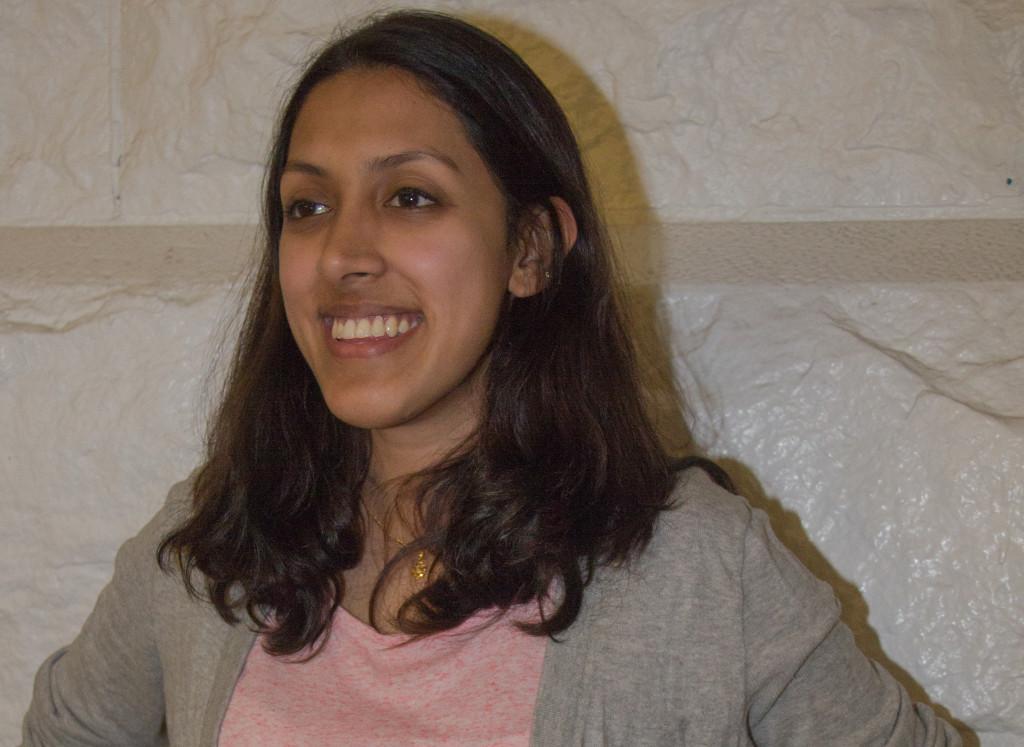On Jan. 9, two Macalester students won “Outstanding Student Poster” prizes at the world’s largest math conference, the Joint Mathematics Meetings in Seattle, WA. Lucas Gagnon ’16 and Esha Datta ’17 presented their summer research to a panel of three judges during this four-day math conference as part of the undergraduate poster session, in which around 300 undergraduate students presented research.
Datta’s poster, “The Topology of Systems of Coupled Oscillators,” used the relatively new field of topology — looking at the shape of data — to observe how oscillators begin to synchronize. An oscillator is, as Datta describes, “anything that goes back and forth.” Datta gave an example involving fireflies. “What’s cool about fireflies,” she said, “is, in nature, over time a group of fireflies will blink in unison. That’s what’s known as coupling.”
Gagnon’s poster, “Linear Bases for McKay Centralizer Algebras,” describes research he conducted with professor Tom Halverson covering the physical representation of algebraic concepts. Ultimately, Gagnon said he thinks “you need a PhD to properly explain it to someone.”
Gagnon is a math major at Macalester from Ithaca, NY. He has been interested in math since high school. After Mac he plans to take a year away from academia before applying to graduate school for mathematics.
Datta is a pure mathematics and economics double major at Macalester from Palo Alto, CA. Unlike Gagnon, Datta recalls disliking math in high school: “I was a really terrible math student in high school. I wouldn’t do my homework. I would just scrape by.” She discovered her passion here at Mac, when she took Multivariable Calculus and Discrete Math.
Gagnon described the conference as a mix of networking and expositions by well-known mathematicians, including a section that combined math and art. In addition to math, Lucas enjoys making sculptures.
His only regret was not having the time to see all the exhibits: “There were so many other cool posters that I sort of saw or heard about but didn’t actually have the chance to go to … I was very envious of people who had partners.”
For Datta, the conference exposed her to math’s variety.
“Some people think math ends at calculus, and it doesn’t go any further than that. Whereas, in my own experience, math starts with calculus and it just kind of goes from there,” she said.





Steven Terry • Sep 11, 2019 at 1:45 pm
With the whole thing that seems to be building inside this particular subject material, many of your opinions are generally quite radical. On the other hand, I am sorry, because I can not subscribe to your entire plan, all be it exciting none the less. It seems to everyone that your commentary are not totally rationalized and in simple fact you are generally your self not even totally confident of the argument. In any event I did take pleasure in reading it.
Claire Buckland • Sep 8, 2019 at 4:11 pm
Thanks for your write-up. I would also like to say that the very first thing you will need to accomplish is determine if you really need credit score improvement. To do that you will have to get your hands on a replica of your credit score. That should not be difficult, since the government makes it necessary that you are allowed to obtain one free copy of your real credit report on a yearly basis. You just have to request that from the right persons. You can either check out the website owned by the Federal Trade Commission as well as contact one of the leading credit agencies instantly.